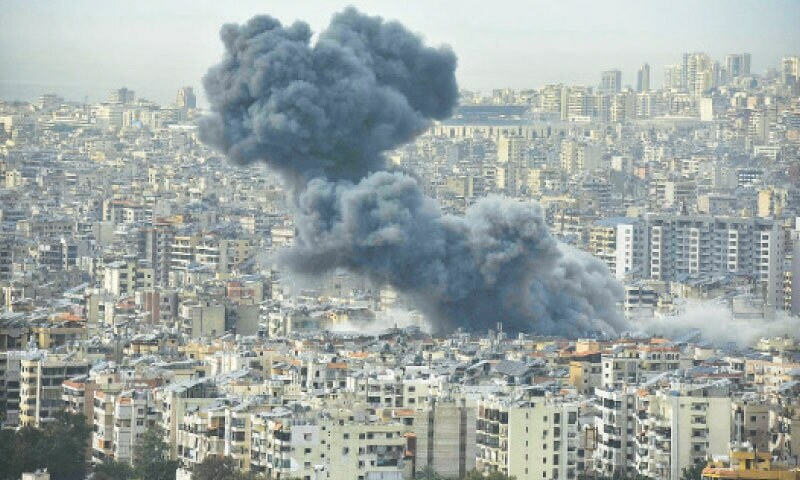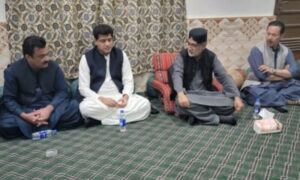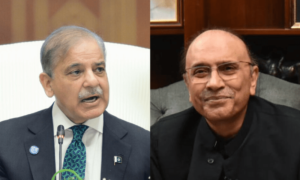JERUSALEM: Israel on Friday carried out its first major airstrike on Beirut’s southern suburbs in months in retaliation for what it claimed an earlier rocket attack on Israel from Lebanon in the most serious test of a shaky ceasefire deal agreed in November.
Hezbollah denied any role in the rocket fire on Friday and on March 22. Lebanon President Joseph Aoun said a Lebanese investigation into last week’s attack on Israel from Lebanon did not point to Hezbollah and called Israel’s Friday’s strike on Beirut unjustified.
The Israeli strike targeted a building in the southern suburbs of the Lebanese capital, a Hezbollah stronghold known as the Dahiyeh, that Israel asserted was a Hezbollah drone storage facility.
The Lebanon ceasefire has looked increasingly flimsy in recent weeks as Israel delayed a promised troop withdrawal from Lebanon in January and claimed last week it had intercepted rockets fired on March 22, which led it to bombard targets in southern Lebanon.
France condemns Israeli strike on Beirut, demands its complete withdrawal from Lebanon; Hezbollah denies role in rocket attack
The south Beirut airstrike on Friday was heard across the Lebanese capital and produced a large column of black smoke. It followed an evacuation order by Israel’s military for the neighbourhood, and three smaller targeted drone strikes on the building intended as warning shots, security sources said.
France criticises Israeli attack
French President Emmanuel Macron, whose government helped mediate the ceasefire in November, criticised Israel for its “unacceptable strikes on Beirut” that he said did not respect the ceasefire.
“The Israeli army must withdraw as quickly as possible from the five positions it continues to occupy in Lebanese territory,” he said.
Macron said that he would discuss the attack with US President Donald Trump “in the coming hours” and with Israeli Prime Minister Benjamin Netanyahu within two days.
“There is no activity that justifies such strikes,” Macron said. “It is an absolute necessity that the framework that we defined, and that was agreed to by Lebanon and Israel, is duly respected. Today it was unilaterally not respected by Israel.”
Israel had provided no information or evidence of any action that could justify the attack, Macron added.
UN concerned at Israeli strike
The United Nations Special Coordinator for Lebanon, Jeanine Hennis-Plasschaert, said the firing across the southern border on Friday was “deeply concerning.”
“Any exchange of fire is one too many. A return to wider conflict in Lebanon would be devastating for civilians on both sides of the Blue Line and must be avoided at all costs,” she said in a written statement.
Lebanon’s official National News Agency reported Israeli shelling on Friday around several southern villages including Naqura, where the UN peacekeeping mission is based.
PM orders arrest of attackers
Lebanese Prime Minister Nawaf Salam urged the army on Friday to quickly identify and arrest those behind rocket fire towards Israel.
Salam contacted the army chief “and asked him to act quickly to undertake the necessary investigations to uncover those behind the irresponsible rocket fire that threatens Lebanon’s stability and security”, according to a statement from his office.
The statement also said Salam had also been in contact with unspecified foreign officials to press for Israel to “stop its repeated attacks”.
Israel has continued to carry out air raids in south and east Lebanon since the ceasefire, striking what it claims are Hezbollah military targets that violated the agreement. In a statement on Telegram, Hezbollah said it “confirms the party’s respect for the ceasefire agreement and denies any involvement in the rockets launched today from the south of Lebanon”.
Under the ceasefire terms, Israel was due to complete its withdrawal from Lebanon by Feb 18 after missing a January deadline, yet it has kept troops at five locations.
Published in Dawn, March 29th, 2025









